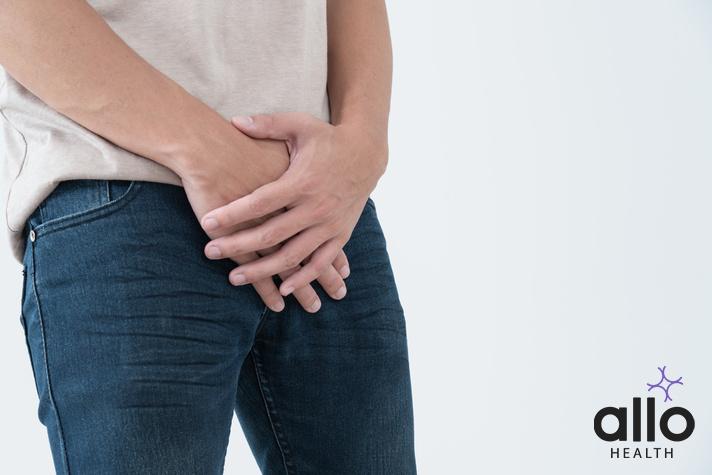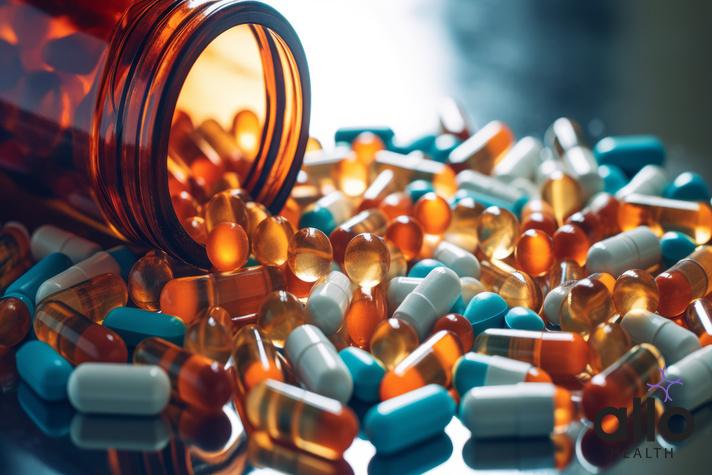Link Between Precum and Premature Ejaculation: Causes, Treatments, and Health Tips

Allo Health is dedicated to personalized well-being, offering support and trusted information tailored to individual health goals. The platform emphasizes human-generated content, led by a distinguished medical team of experts, including physicians and sexual health specialists. Their commitment to credibility involves rigorous fact-checking, authoritative research, and continuous updates to ensure accurate, up-to-date information. Allo Health's unique approach goes beyond conventional platforms, providing expert-led insights and a continuous commitment to excellence, with user feedback playing a crucial role in shaping the platform's authoritative voice.

Dr Sanina Mansoor holds MBBS degree from Yenepoya university,Mangalore.She has 8 years of experience working as a medical officer at various health centres and medical colleges.
Why This Was Upated?
Our experts continually monitor the health and wellness space, and we update our articles when new information became available.
Updated on 13 April, 2024
- Article was updated as part of our commitment to diversity, equity, and inclusion.

"The following blog article provides general information and insights on various topics. However, it is important to note that the information presented is not intended as professional advice in any specific field or area. The content of this blog is for general educational and informational purposes only.
Book consultation
The content should not be interpreted as endorsement, recommendation, or guarantee of any product, service, or information mentioned. Readers are solely responsible for the decisions and actions they take based on the information provided in this blog. It is essential to exercise individual judgment, critical thinking, and personal responsibility when applying or implementing any information or suggestions discussed in the blog."
Premature ejaculation (PE) is a common sexual dysfunction that affects many men worldwide, impacting their sexual experiences and relationships. While various factors contribute to PE, one intriguing aspect is the link between precum and premature ejaculation. In this article, we will explore the connection between these two phenomena, examine the causes of premature ejaculation, and discuss effective treatment approaches and health tips for better sexual health.
What is Premature Ejaculation?
Premature ejaculation (PE) is a common sexual dysfunction characterized by the rapid and uncontrollable ejaculation of semen during sexual activities, often occurring within one minute after penetration. It can adversely affect sexual relationships, causing frustration and anxiety.
Key symptoms of premature ejaculation include:
- Rapid Ejaculation: The primary symptom is ejaculating shortly after or even before sexual penetration, hindering the ability to engage in satisfying sexual intercourse.
- Sexual Frustration: Individuals experiencing PE often feel frustrated due to their inability to control the timing of ejaculation.
- Psychological Factors: PE can be influenced by psychological factors such as performance anxiety, lack of confidence, or stress, affecting overall sexual performance and desire.
- Impact on Sexual Relationships: PE can strain relationships as partners may feel unsatisfied or disconnected due to the short duration of sexual intercourse.
- Seeking Treatment: Recognizing these symptoms and seeking help from a health care provider or mental health professional is crucial for managing PE. Treatments may include behavioral therapy, medications like SSRIs or tricyclic antidepressants, and the use of techniques such as the pause-squeeze method or stop-start method to delay ejaculation. Addressing PE can lead to improved sexual function and satisfaction for individuals and their partners.
What is pre-cum?
Precum, scientifically known as pre-ejaculate fluid, is a clear, lubricating substance produced by the Cowper’s glands in males during sexual activities, such as foreplay or arousal. Its primary role is to prepare the urethra for the passage of sperm during ejaculation. Key points regarding precum and its symptoms include:
- Composition: Precum is a viscous fluid that may contain trace amounts of sperm, making it a potential risk for unintended pregnancy when engaging in sexual activities without contraception.
- Purpose: Its main function is to provide lubrication and neutralize the acidity in the urethra, creating a more favorable environment for sperm.
- Symptoms: Precum itself does not exhibit specific symptoms. However, its presence can be noticed during sexual encounters as a clear fluid emitting from the urethra before ejaculation.
- Role in Fertility: While precum may contain sperm, the amount is generally low and may not be enough to result in pregnancy. Nevertheless, caution is advised, and the withdrawal method may not provide reliable contraception.
Understanding precum and its role in sexual activities is essential for individuals practicing safe sex and contraception to prevent unintended pregnancies and protect sexual health.
Causes of Premature Ejaculation and Precum
Premature ejaculation (PE) and precum (pre-ejaculate fluid) are two distinct aspects of male sexual health, each with its own set of causes and contributing factors. Let’s explore the key causes of both:
Causes of Premature Ejaculation (PE):
- Psychological Factors: Psychological factors such as anxiety, lack of confidence, and performance pressure can lead to rapid ejaculation. Stress, depression, or other mental health conditions may exacerbate the concern.
- Health Conditions: Medical concerns like erectile dysfunction or hormonal imbalances can disrupt the natural timing of ejaculation. Health care providers can diagnose and treat these underlying conditions.
- Sexual Intimacy: The level of sexual intimacy and activity before ejaculation plays a role. Rapid ejaculation can occur due to heightened arousal or excitement, especially during early sexual encounters.
- Relationship Dynamics: Relationship concerns or communication concerns with a partner can contribute to PE. Couples therapy can help address these concerns and improve sexual experiences.
- Medications: Certain medications, particularly selective serotonin reuptake inhibitors (SSRIs) and tricyclic antidepressants, can delay ejaculation. These drugs affect serotonin levels, which play a crucial role in ejaculatory control.
Causes of Precum (Pre-Ejaculate Fluid):
- Physiological Function: Precum is a natural lubricating fluid produced by the Cowper’s glands during sexual arousal. Its primary function is to prepare the urethra for the passage of sperm during sexual intercourse.
- Potential Sperm Presence: While precum itself does not typically contain sperm, there is a small chance of sperm being present in it. This makes it a potential risk for unintended pregnancy when used as a withdrawal method.
Premature ejaculation is often influenced by psychological factors, health conditions, sexual intimacy, and relationship dynamics. It is a treatable condition that can be addressed through various approaches, including behavioral therapy and medication.
On the other hand, precum is a natural physiological response during sexual arousal, primarily serving as a lubricant, but it should be used cautiously as a method of contraception due to the small possibility of sperm presence. Understanding these causes can help individuals make informed decisions about their sexual health and seek appropriate treatment when necessary.
Link Between Premature Ejaculation and Precum

Premature ejaculation (PE) and precum (pre-ejaculate fluid) are two distinct aspects of male sexual physiology, but they can be linked in certain contexts. Here’s about their connection:
- Physiological Sequence: In the natural course of a sexual encounter, precum typically precedes ejaculation. Pre-ejaculate fluid is produced to lubricate the urethra and prepare it for the passage of sperm during sexual activities.
- Arousal and Anxiety: Anxiety and arousal levels can impact both precum and PE. High levels of anxiety, performance pressure, or psychological factors may contribute to premature ejaculation. Likewise, these factors can also affect the production of precum, as sexual arousal triggers its release.
- Control Mechanisms: Learning to control the timing of ejaculation is crucial for managing PE. Techniques like the pause-squeeze and stop-start methods involve a degree of control over the release of both precum and semen.
- Treatment Implications: Addressing psychological factors and performance anxiety can help individuals manage premature ejaculation. Health care providers may recommend treatments like behavioral therapy, SSRIs, or tricyclic antidepressants, which can influence both ejaculatory control and the production of precum.
- Impact on Sexual Experience: The premature climax experienced in PE can lead to frustration for both partners and negatively impact sexual satisfaction. Effective treatment can improve sexual experiences by delaying ejaculation and potentially altering precum production patterns.
While premature ejaculation and precum are distinct phenomena, they share a common link in the context of sexual arousal and control. Addressing psychological factors and seeking appropriate treatment can positively impact both aspects, enhancing overall sexual experiences and satisfaction.
Treatment and Prevention of Precum
Treatment and prevention of precum primarily revolve around understanding its nature and practicing safe sexual activities.
- Education: Understanding that precum is a natural lubricant produced by the body can alleviate unnecessary concerns about it containing sperm.
- Safe Sexual Practices: Using barrier methods such as condoms can prevent contact between precum and the partner’s genitalia, reducing the risk of unintended pregnancy. Avoiding activities that lead to genital contact before properly protected sexual intercourse can also minimize risks.
- Health Tips: Maintaining good overall health, including mental health, can contribute to better sexual function and control over precum.
- Alternative Medicine Treatments: Some individuals explore natural treatment options, although their effectiveness varies, and they should be approached cautiously.
- Communication: Open and honest communication with a healthcare professional or mental health provider can address concerns related to precum and its impact on sexual experiences.
Prevention of unintended consequences related to precum involves safe sexual practices, education, and maintaining overall health. If concerns persist, seeking guidance from a healthcare provider or mental health professional is advisable.
Treatment and Prevention of Premature Ejaculation

Treatment
Behavioral Therapy:
- Behavioral therapy, including sex therapy and the use of techniques like the pause-squeeze and stop-start methods, helps individuals gain better control over ejaculation.
- Communication with a mental health provider or health professional can address underlying psychological factors, such as lack of confidence or mental health conditions.
Medications:
- Health care providers may prescribe selective serotonin reuptake inhibitors (SSRIs) or tricyclic antidepressants to delay ejaculation by altering serotonin levels.
- Combination therapy involving both medication and behavioral approaches is often effective in managing premature ejaculation.
Natural Treatments:
- Some individuals explore alternative medicine treatments, but their efficacy varies, and consultation with a health care provider is advisable.
Barrier Methods:
- Climax control condoms, designed to reduce sensitivity, can help prolong sexual intercourse.
Communication and Relationship:
- Open communication with a partner about sexual desires and concerns is key to addressing premature ejaculation’s impact on sexual relationships.
- Couples therapy can improve understanding and intimacy in the context of PE.
Prevention:
Maintain Good Health:
- A healthy lifestyle, including regular exercise, a balanced diet, and managing stress, can contribute to better sexual function.
Manage Psychological Factors:
- Addressing mental health conditions and building self-confidence through counseling or therapy can help prevent PE.
Practice Techniques:
- Engaging in the pause-squeeze or stop-start techniques during sexual activities can aid in controlling ejaculation.
Seek Professional Guidance:
- Don’t hesitate to consult a health care provider or mental health professional if premature ejaculation is a concern.
By combining treatments, addressing psychological factors, and maintaining a healthy lifestyle, individuals can effectively manage and prevent premature ejaculation, enhancing their sexual experiences and overall well-being.
Conclusion
Premature ejaculation can be a frustrating experience, affecting one’s sexual performance and overall well-being. While the link between precum and premature ejaculation remains a subject of ongoing research, understanding the causes and treatment options for PE can help individuals improve their sexual function and satisfaction. Remember that seeking guidance from a health care professional or mental health provider is essential for effective management.
Most Asked Questions
-
What causes premature ejaculation?
Premature ejaculation can be caused by various factors, including psychological concerns like anxiety or relationship concerns, medical conditions such as erectile dysfunction, hormone imbalances, and even the use of recreational drugs.
-
Is there a link between precum and premature ejaculation?
Some people report a connection between precum (the clear fluid before ejaculation) and premature ejaculation, suggesting that precum may increase sensitivity. However, more research is needed to confirm this link.
-
How can I treat premature ejaculation?
There are several treatment options available, including behavioral therapy techniques like the pause-squeeze and stop-start methods, medications prescribed by healthcare providers, a combination of therapies, and even natural remedies to improve control over ejaculation.
-
What are some health tips for managing premature ejaculation?
To improve your sexual performance and overall well-being, it’s important to consult with a healthcare provider, share your health history, practice self-help techniques, consider using numbing creams, and manage stress through relaxation methods and counseling.






































